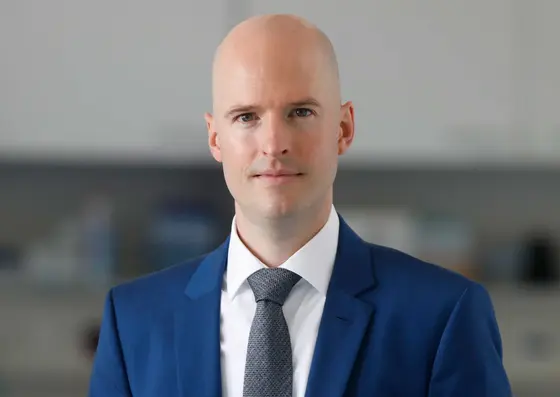Using immune cells to fight brain tumors – that is the goal of Lukas Bunse, who is this year's recipient of the Heinz Maier-Leibnitz Prize from the German Research Foundation (DFG). The physician and scientist is being honored for the development and clinical implementation of immunotherapeutic strategies against malignant brain tumors. Lukas Bunse is a neurologist at the University Hospital Mannheim (UMM) and conducts research at the German Cancer Research Center (DKFZ).
Malignant brain tumors from the group of gliomas and glioblastomas are extremely difficult to treat with currently available therapies. During his medical studies, Lukas Bunse was already involved in the development of a vaccine against a specific form of brain tumor known as IDH1-mutated gliomas. This vaccine has since been successfully tested for tolerability and immunogenicity in a phase I study and is now being investigated for efficacy in further trials.
Glioblastomas, which mainly affect middle-aged people, have an even worse prognosis than IDH-mutated gliomas. In contrast to gliomas, they do not present a uniform mutation as a target antigen on their surface against which vaccination could be effective. Bunse and his team chose a different approach. First, they succeeded in identifying suitable target molecules for immune defense in glioblastoma cells. They then equipped the patient's own T cells outside the body with receptors for these tumor proteins. The T cells that had been armed in this way were transferred back to the patient and were able to hunt down brain tumor cells
These approaches have already proven successful in mice. The first clinical trials of cellular immunotherapy with transgenic T cells are now in preparation.
“We warmly congratulate Lukas Bunse on this prestigious award. Unfortunately, cancer medicine has often had little to offer against malignant brain tumors until now. New effective treatment approaches are therefore urgently needed. Lukas Bunse's research, which is always geared towards rapidly achieving clinical improvements, can make a decisive contribution here,” said Michael Baumann, Chairman of the DKFZ's Management Board, in recognition of the prizewinner's scientific achievements.
Lukas Bunse studied medicine at the University of Heidelberg and at University College London. His medical doctoral thesis dealt with certain spontaneous immune responses in glioma patients. In 2020, he completed another doctoral thesis in biology. He is a Clinician Scientist at the Mannheim Medical Faculty of Heidelberg University and completed his specialist training as a neurologist at the Neurological Clinic of Mannheim University Hospital from 2019 to 2024. He has been a senior physician in neurology since 2024. He also conducts research as a team leader in the Clinical Cooperation Unit Neuroimmunology and Brain Tumor Immunology at the German Cancer Research Center in Heidelberg. After winning the Ruprecht Karl Prize in 2018 and the Hella Bühler Prize, worth 100,000 euros, in 2019, he was awarded the Novartis Prize for Therapy-Relevant Immunological Research by the German Society of Immunology in 2023.
This year, the DFG is awarding the Heinz Maier-Leibnitz Prize to ten researchers. The prize is endowed with 200,000 euros each and is considered Germany's most important award for researchers in the early stages of their careers. The award ceremony will take place in Berlin on June 3.

